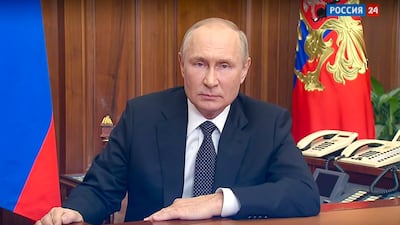Russian President Vladimir Putin on Wednesday announced a partial military mobilisation, conscripting Russians in reserve to fight in Ukraine.
In a rare televised address to the nation, in which he referred to nuclear weapons, he warned that Russia would use "all the means available" in Ukraine. He stressed the threat was "not a bluff".
The move comes a day after four Russian-controlled regions in eastern and southern Ukraine announced plans to hold votes on becoming integral parts of Russia. These would potentially pave the way for Russia to annex an area of the country the size of Hungary.
The referendums, which have been expected since the first months of the war, will start on Friday in the Luhansk, Kherson and partly Russian-controlled Zaporizhzhia and Donetsk regions.
"When the territorial integrity of our country is threatened, we will certainly use all the means at our disposal to protect Russia and our people," Mr Putin said in the delayed address, which was originally scheduled to be broadcast on Tuesday night.
Russian forces have been on back foot in Ukraine since the start of September, when Kyiv launched a lightning offensive. This has led to Ukraine retaking about 6,000 square kilometres of territory.
Recent Ukrainian gains include almost all of Kharkiv province, but Russia still has control over about a fifth of the country.
Announcing Russia's first military mobilisation since the Second World War, Mr Putin said the West was aiming to "weaken, divide and ultimately destroy our country".
"Russian citizens can be sure that the territorial integrity of our motherland, our freedom and defences shall be secured, I shall stress by all means available to us," he said.
"And those trying to blackmail us with nuclear weapons should know the tables can turn on them. In our historic tradition, our people have it in their destiny to stop those who are trying to subjugate our motherland and divide it. And we will do that now. It will happen."
Nato Secretary General Jens Stoltenberg denounced Moscow's plans for what he called sham referendums in occupied parts of Ukraine, warning Mr Putin against further escalating the conflict.
“Such sham votes, referendums, do not have any legitimacy and therefore they do not change the nature of the conflict,” Mr Stoltenberg told Bloomberg TV.
The Kremlin-backed efforts to swallow up four regions could set the stage for Moscow to further escalate the war after a series of Ukrainian successes on the battlefield.
Russia's boost of military power was due to start on Wednesday, Mr Putin said.
“We are talking about partial mobilisation, that is, only citizens who are currently in the reserve will be subject to conscription, and above all, those who served in the armed forces [and] have a certain military speciality and relevant experience,” he said.
The yoke of Ukraine
Russia's Defence Minister Sergey Shoigu said on television that "300,000 reservists will be called up", which is "just over 1 per cent" of the number of people who can be mobilised in the country.
He said the "line of contact" in Ukraine was more than 1,000 kilometres long and the primary goal of mobilisation was to help secure territories behind and on the front line. Mr Shoigu said Russia was "fighting not so much Ukraine as the collective West".
Mr Putin reaffirmed in his speech Russia's aim to liberate eastern Ukraine's Donbas industrial heartland. He said most people in the region did not want to return to what he called the yoke of Ukraine.
Melinda Simmons, Britain's ambassador to Ukraine, wrote on Twitter: "Watched Putin's speech. He still refuses to understand Ukraine. Partial mobilisation and sham referenda don't change that essential weakness."
The UK's Defence Secretary, Ben Wallace, said Mr Putin's breaking of his own promises not to mobilise parts of his population and the illegal annexation of parts of Ukraine were an admission that his invasion was failing.
"He and his defence minister have sent tens of thousands of their own citizens to their deaths, ill-equipped and badly led," he said.
"No amount of threats and propaganda can hide the fact that Ukraine is winning this war, the international community are united and Russia is becoming a global pariah.”
Gillian Keegan, a UK Foreign Office minister, said the announcement was a "worrying escalation" and called for calm in the face of Mr Putin's threats.
"Some of the language there was quite concerning at the end and obviously we would urge for calm," the Chichester MP said.
"It's something that we should take very seriously because we're not in control.
"I'm not sure he's in control either ... this is obviously an escalation and, of course, for the Russian people now they will be conscripted into this war."
German's Economy Minister, Robert Habeck, said Putin's speech was "another terrible and wrong step".
"We will of course assess politically and discuss how to respond to it," he said.
"In any case, for me and the German government it’s clear that we will continue to fully support Ukraine during this difficult time."


